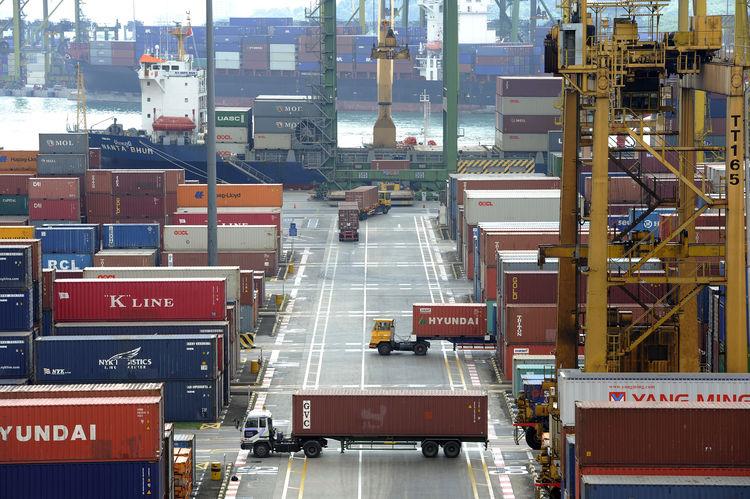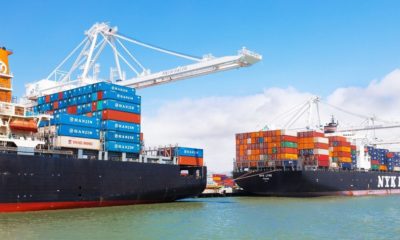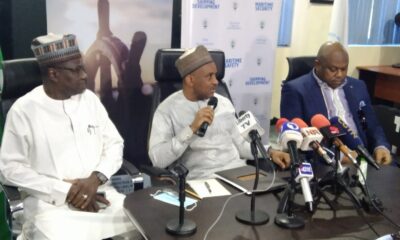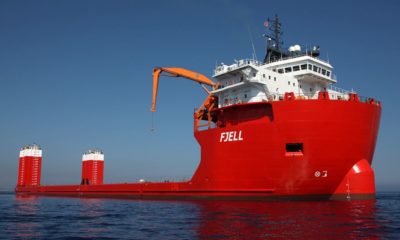- Coastal Trade: Nigerian Operators Fall Behind Amid Challenges
The implementation of the Coastal and Inland Shipping (Cabotage) Act is being hampered by the myriad of challenges facing local operators in the shipping sector, ANNA OKON writes.
Cabotage, otherwise known as coastal trade, involves carriage of goods (and passengers) within the territorial and inland waters of any nation by ships and any other means of transportation from one place to the other in the same country.
As part of maritime reforms, Nigeria enacted the Cabotage Act 2003, which was designed to restrict foreign participation in Nigeria’s domestic coastal trade.
The Act makes provision for only ships that are built, flagged and manned by Nigerians to operate in Nigerian coastal waters.
The Nigerian Maritime Administration and Safety Agency had stated that even though the Act reserved the right of coastal trade to Nigerians, opportunities existed for foreign involvement.
But foreign participation in Nigerian coastal waters has overshadowed local participation owing to challenges peculiar to the Nigerian environment.
For instance, 90 per cent of the vessels trading on Nigerian waters are owned, manned and operated by foreign shipping lines, with Nigerian operators managing fishing boats and inland water transport boats that ferry goods and passengers to and from short distances.
The large cargo vessels and oil bunkers are all operated by foreign shipping lines.
The participation of local shipowners in the transportation of petroleum products ended when the Nigerian National Petroleum Corporation became the sole importer of products.
“Local shipping firms are hurting,” The President, Shipowners Association of Nigeria, Dr Mkgeorge Onyung, responded when asked about the fate of the industry in the light of the NNPC monopoly.
He said most of the shipowners had invested money and time in the business, adding, “Some of them borrowed money from banks to acquire those assets and the interest on the loans is increasing.
“When there is no business for them to do, the assets will decay and people will say local operators don’t have capacity. How can they develop capacity when they don’t have business?”
The President, Nigerian Shipowners Association, Aminu Umar, told our correspondent that the NNPC employed the services of foreign vessels to lift its products.
He said the practice was a departure from the past when oil marketers employed local shipowners to ferry petroleum products for them.
Responding to the yearnings of local operators, NIMASA had made several attempts, in collaboration with the Nigerian Content Development and Monitoring Board, to enforce the Cabotage law and increase participation of indigenous operators in the coastal trade.
In 2018, the agency cancelled waivers for foreign seafarers intending to work in vessels operating in Nigerian waters.
In February this year, the Director-General, NIMASA, Dr Dakuku Peterside, said the agency would no longer entertain any form of application for waivers under the Cabotage Act, particularly from oil firms.
Recently, the agency placed an embargo on the importation of cabotage vessels.
But all these efforts have been unable to bring about a significant increase in the participation of local operators in the shipping business.
Challenges facing local operators
Local operators are hampered majorly by finance.
Shipping business is capital-intensive and it would take the involvement of government for operators to build and operate a successful shipyard, according to the Managing Director, Genesis Worldwide Shipping, Capt. Emmanuel Iheanacho.
“The only thing that one would like to see is where the government recognises the critical nature of some of the things you are trying to do and provides a kind of guarantee that can get you the funding you need. When the government stands as a surety, then the financial institutions will have confidence to lend money to the investor.”
According to him, about $10m to $12m is needed to build a 15,000-tonne ship that can sail on a shallow sea with a draft of 6.5 metres.
Iheanacho disclosed that he obtained foreign grant to invest in his refinery and shipping business and the condition for that grant was that he must employ people from the country that gave him the grant.
Most Nigerian operators do not have access to finance, even for acquisition and maintenance of service boats.
This, in part, has resulted in their inability to build capacity and maintain their existing boats.
Our correspondent learnt that some local operators’ contracts were terminated by international oil companies because they did not have functional service boats and often defaulted in the contracts.
The Chief Executive Officer, Marine Platforms Limited, Taofeek Adegbite, highlighted the challenge of operating a shipping firm.
He said, “A vessel is a very expensive thing to maintain. You need to provision monthly. In fact, you must set your day rate per month aside for dry docking and it is simply not money you start running around looking for when you want to dry-dock your boat.
“If you want to dry-dock your boat, you are looking at a million naira a month; that is not money you can call your friends to lend you. You must understand what we are talking about here. It is not meant for the lily-livered.”
Operators had set their sights on the Cabotage Vessel Financing Fund but their hopes had proved futile as they had been unable to access the $124m fund set up to aid them in buying new vessels and maintaining existing ones.
Another challenge has been the shortage of skilled workers in the industry.
The maritime institutions in Nigeria cannot offer Certificate of Competence to seafarers and this necessitated additional training in foreign schools to enable them to obtain the CoC and be employed aboard ocean-going vessels.
As long as Nigerians do not have the necessary qualifications, they cannot be employed on ocean-going vessels, including the ones calling on Nigeria.
The National President, Nigerian Merchant Navy Officers and Water Transport Senior Staff Association, Mr Mathew Alalade, pointed out that if the foreigners were made to stop operating in Nigeria, there may be no indigenous seafarers to take up their jobs.
He said, “We don’t have people to replace these people because our training institutions have not been upgraded to higher level to issue CoC that accommodates all cadres of people on water.
“We must take it easy with the Cabotage law because our schools need be upgraded to issue first-class CoC.”


 Naira4 weeks ago
Naira4 weeks ago


 Naira4 weeks ago
Naira4 weeks ago




 Naira4 weeks ago
Naira4 weeks ago




 Naira3 weeks ago
Naira3 weeks ago
 Commodities4 weeks ago
Commodities4 weeks ago


 News4 weeks ago
News4 weeks ago
 Travel4 weeks ago
Travel4 weeks ago




 Naira3 weeks ago
Naira3 weeks ago















